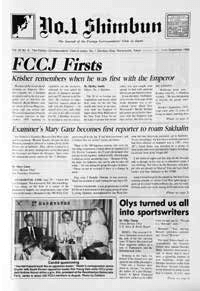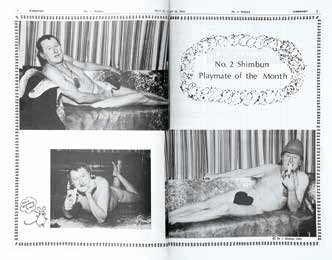Issue:

““Because of fog, the plane for Sakhalin may not be able to take off today.” . . . Outside, it was overcast. There was no plane in sight waiting for any fog to lift”
– Mary Ganz, first Western reporter in Sakhalin, Vol. 20 No. 9, Sept. 1988
A new type of Brother
This story is being written on yet another devilishly clever Japanese product. It weighs all of two kilograms, runs on four flashlight batteries, prints 132 characters that’s 44 more than an ordinary typewriter and is as quiet as a desktop calculator, which it also happens to be.
“Those bastards have done it again,” was the response of a veteran American reporter, who begged me to sell him the demonstrator model for which I had gladly forked out the full price. The product went on sale in Japan, Canada and the U.S. just before Christmas.
The Brother EP-20 Personal Printer threatens to do to portable typewriters what the Sony transistor did to the vacuum tube radio.
The machine has a memory function which allows the writers to make corrections on a liquid crystal screen instead of making mistakes on paper. This gem costs all of ¥48,000, which according to the built in calculator, comes to $195.90 at present rates of exchange.
– Andrew Horvat,
Vol. 14 No. 12, Dec. 1982
No Shakespeare festival
The King broods in his castle, an aging despot corrupted by power and besieged by physical ailments. His scheming, avaricious wife and the general who is his most trusty crony may have conspired to murder the pretender to the throne.Now, challenged by the pretender’s widow, they try desperately to keep matters from unraveling into the worst of all possible nightmares.
As the King cowers inside the moat, his two most trusted allies hatch new plots against him, and the nation’s religious leader rallies the people in the name of God to help overthrow the tyrant.
The King has threatened repeatedly to crush his enemies. But with his very survival at stake, he must decide whether to retaliate. His power is eroding. He fears the judgment of history. He hesitates . . . and then it is too late. The King flees and his crown is claimed by who else but the widow of the man whose murder began it all?
MANILA The hundreds of journalists who spent February in the Philippines are to be excused if they thought they’d blundered into a Shakespeare festival. But no question: the fall of Ferdinand Marcos and the triumph of Corazon Aquino must rank as one of this century’s great political dramas, one about which even the most calloused reporter could hardly be cynical.
When it was all over, one heard Richardo Cruz, cab driver No. 1 at the Manila Hotel, say: “We owe you foreign journalists a lot. Without you, none of this would have happened.
Such comments were heard often in the aftermath of the “people’s power” revolution that vaulted an obscure 53-year-old housewife into the presidency of the world’s 16th-largest nation.
– Richard Pyle,
Vol. 18 No. 2 , Feb. 1986
Abe says he’ll do his best
On Sept. 4 [1985] . . . four representatives of the foreign press were invited to the Foreign Ministry for a meeting with Shintaro Abe, the foreign minister. The meeting lasted about 30 minutes. Below is a transcript of some of the exchanges that took place through an interpreter. . .
Abe: Freedom of the press is one of the basic principles of democracy in Japan, and any restrictions or limitations on the activities of foreign correspondents might be perceived as a symbol of the closed character of Japanese society, which would be very undesirable. . . .
Before I entered politics I myself was working as a reporter for about ten years and I belonged then to various kisha clubs. Of course, individual reporters are free to do their work as they please, but the kisha clubs themselves are managed very strictly and are organized in a very old-fashioned way. When I was working inside them I felt myself that the system should be reformed quickly. I remember that when I was young I and some others used to talk about improving the kisha club system, but the system was very strong, with a very long history and traditions going back as far as the Meiji Era.
The press is supposed to uphold the banner of democracy and freedom, and from that point of view the kisha club system is misguided. . . .
I have traveled around the world a great deal, but I have never seen anything like our kisha club system anywhere else. But I think things will get better now.
– Vol. 17 No. 8, Aug. 1985
Fear and loathing in the people’s paradise
PYONGYANG The government interpreter shifted uncomfortably on the wooden pew of the Protestant church built here as a showcase to North Korea’s supposed freedom of religion. The Rev. Pak Chun Gun leaned forward in his seat, listening politely to the insistent question of the American reporter.
“Who is more important?” I asked the pastor. “President Kim Il Sung, or God?” The interpreter, an advanced English language student at Kim Il Sung University, regarded me with a look of blank innocence.
“Who’s God?” he asked.
– Richard Read, Vol. 21 No. 9, Sept. 1989
China’s Sankei syndrome
China’s refusal of visas to two Sankei Shimbun newsmen due to accompany Prime Minister Zenko Suzuki on his visit to China early this fall seems to have been a singular non event in the Japanese newspaper world. No official protests are known to have been made, either by the Foreign Ministry or the Japan Newspaper Publishers & Editors Association, and even the Sankei seemed resigned, terming the incident “deeply regrettable” in a nevertheless strongly worded editorial. . . .
The Sankei which has an office in Taipei is the only major Japanese daily without a bureau in Beijing. Maybe because, as one observer said, “the Sankei prefers printing the kind of juicy gossip that can be picked up in Hong Kong or Taiwan to the official pronouncements handed out in Beijing.”
– Vol. 14 No. 11,
Nov. 1982
Kisha clubs present problems for photographers too
How can I adequately describe the kisha club system in Japan without using such words as “medieval,” “byzantine” or “antiquated.” It is difficult for the Western mind and especially the American mind to grasp. We are talking about a tight group which is expected to pretty much print as gospel what is handed out to them by the news source. One veteran photographer who learned I was writing about press access in Japan joked, “Gonna be a short story, huh?” Photo District News recently asked the Foreign Press Center here in Tokyo what a visiting photographer can expect these days in terms of access to news events. The answer was terse. “Not much.” (Gee, thanks a lot.) “Generally speaking, freelance photographers have a hard time.” (Hit me again.)
– Sonia Katchian,
Vol. 20 No. 2,
Feb. 1988

Equal to equality?
– Vol. 15 No. 4, Apr. 1983
The inimitable Murray Sayle, adventurer/ raconteur/correspondent, tries to redress (or undress) the balance between the appearance of many topless women within the pages of the early No. 1 Shimbun. History will record his success or otherwise.
The verdict
[From the courtroom at the announcement of the verdict of former Prime Minister Kakuei Tanaka’s trial for the Lockheed affair]
Iwould hesitate, then jump from my seat, run down the hall and scramble down seven flights of stairs. . . . I leapt on a waiting motorcycle and raced to the Denki Building where, within minutes after the verdict, I was at the lobby tobacco shop phoning the world’s largest news organization with an exclusive English language eyewitness account.
I was put on hold. Our Tanaka guilty bulletin was already out, quoting Japanese reporters seen dashing out of the court room on live television. All I had to offer the watching world were a few notes, later to be distorted in transmission, describing the look of defiance on Tanaka’s face as he slowly sat down after learning he had been sentenced to four years in prison.
By 10:20 a.m. I had gone to the 20th floor and executed my duties as a pool reporter by typing out three sloppy pages of notes and eating a free hamburger.
Later, when I returned to the court room to relieve Nancy Ukai, the other pool reporter whose lyrical notes were to put my terse scribblings to shame, my interest in the proceedings had shifted from hard news to soft pornography. While the long row of defendants frustrated my perspective of Tanaka, I had a clear and unobstructed view of Mieko Enomoto [the former wife of defendant Toshio Enomoto, Tanaka’s former secretary] in the spectators’ gallery.
I can’t tell you what color tie Tanaka was wearing or whether it hung several inches below his belt as is his custom, but I can tell you that Mieko had her hands clasped on her knee as she crossed her shapely legs. Her fingernails were painted gold. Ms. Enomoto, who attained instant tarento status when she ratted on her ex-husband in a dramatic 1981 court session, first captured my attention upon entering the courtroom about 15 minutes before the session began.
A tall siren in a plaid suit whose neck was clamped in a white brace, she probed about with a hungry gaze, as though searching for a cinematographic “cute meet. ” The neck brace, one could deduce from local reports, was for a case of whiplash she sustained in a recent traffic accident. The conservative wool suit was to offset the saucy image she’d created by baring her breasts in a recent issue of Japan Penthouse.
Now, as her ailing ex-husband sat rigidly listening to the lengthy and detailed text of the verdict – he had his wrists slapped with a one-year suspended sentence Ms. Enomoto sat poised, but hardly alert. Her bovine brown eyes fought off sleep. For her, as for many in the courtroom, the grand finale was getting bit dull.
Tanaka himself made little effort to conceal his impatience with the formalities of justice. Judge Mitsunori Okada tried to read the ruling as quickly as possible, but it took more than 1½ hours. Tanaka for his part struck a series of the atrical poses with an air of restlessness and defiance. One moment he would freeze with his jaw resting in a palm and his elbow propped on the table as he gazed thoughtfully at his closed fan; then he would rock back in his chair and roll his neck with his eyes closed. He was a lion in a cage, captured but not tamed by the court.”
– Karl Schoenberger,
Vol. 15 No. 11,
Nov. 1983

